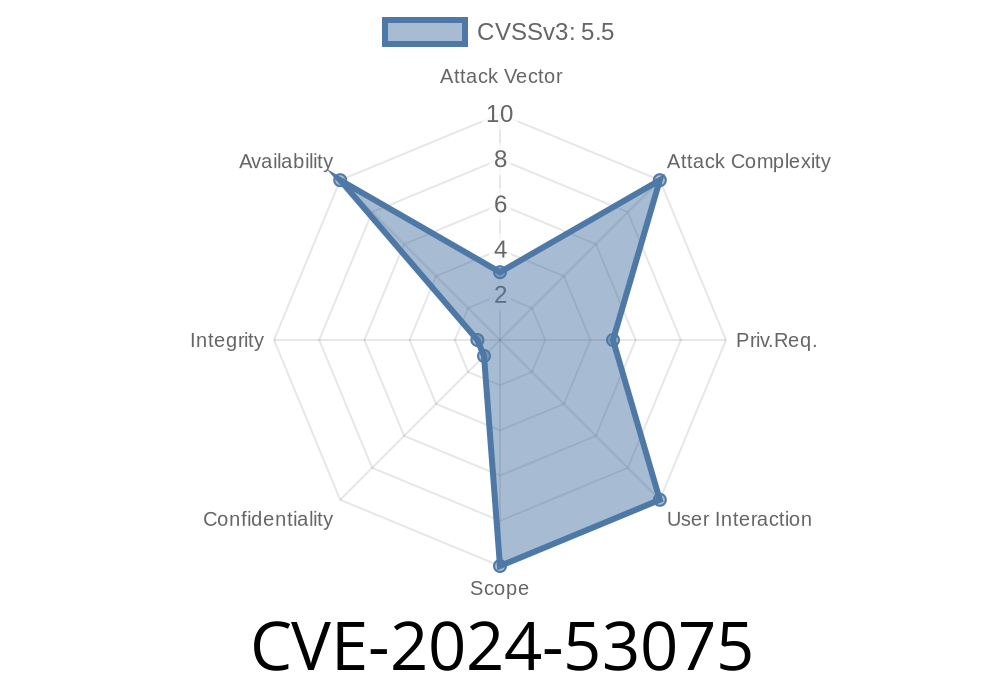In June 2024, a subtle yet important vulnerability was found and patched in the Linux Kernel's RISC-V architecture code. This post will walk you through what CVE-2024-53075 means, why it matters, and how it was fixed in simple terms. If you work with Linux on RISC-V or maintain systems that use the latest Linux kernels, keep reading.
What is CVE-2024-53075?
CVE-2024-53075 addresses a bug in the Linux kernel that could lead to "bad reference counts" on device nodes for CPUs in RISC-V systems. What this means is that, under certain conditions, the system kept a reference (think: a pointer-like handle in memory) to a device node longer than it should have, which could result in resource leaks or instability over time.
What Was Wrong?
In the RISC-V part of the Linux kernel, there's logic to handle "cache leaves"—data structures that help the system keep track of CPU caches. The code needed to fetch the device node for a CPU, but also needed to put it back when it was done (the kernel uses a kind of manual reference counting for these things).
If the system booted using ACPI (a standard for hardware discovery and power management), a quick return was performed, without cleaning up by releasing the reference to the node using of_node_put(). In other words: the code "grabbed" the node but didn't "let go" cleanly when ACPI was involved.
Incorrect Reference Counting: The device node was acquired but not released in all code paths.
2. Potential for Leaks: Over time, especially on machines that use ACPI, this could lead to unbalanced reference counts—eventually causing memory leaks or unexpected kernel behavior.
How Was It Fixed?
The fix is quite elegant. The device node is now only acquired after the branch that returns early for ACPI is passed. That way, every time a node is loaded, there's always a matching release, no matter which path the code takes.
Additionally, the fix improved error checking: if acquiring the device node fails, the code now returns an error (-ENOENT) immediately.
Before (Problematic)
struct device_node *cpu = of_cpu_device_node_get(cpu_id);
#ifdef CONFIG_ACPI
if (acpi_disabled)
// ... does not call of_node_put(cpu)
return;
#endif
do_stuff_with(cpu);
of_node_put(cpu);
After (Patched)
#ifdef CONFIG_ACPI
if (acpi_disabled)
return;
#endif
struct device_node *cpu = of_cpu_device_node_get(cpu_id);
if (!cpu)
return -ENOENT;
do_stuff_with(cpu);
of_node_put(cpu);
Why Does This Matter?
Even though this bug does not constitute a "full remote" or "escalation" security flaw by itself, reference leaks in the kernel can lead to:
Potential system instability (if leaks are severe).
- In rare combinations, attackers might be able to chain reference leaks into more severe exploits, but this was not directly the case here.
Exploitation Details
At this time, no public exploits are known because you would need to trigger the kernel’s ACPI-specific CPU cache code repeatedly in a way that keeps leaking references, which isn't practical for normal attackers. However, malicious code running as root or buggy drivers/tools could, over time, cause very slow resource exhaustion.
It’s not a "critical" bug but is important for those running RISC-V Linux systems with ACPI enabled.
References and Links
- Official Patch Commit (kernel.org)
- CVE Entry at cvedetails.com
- Linux Kernel Documentation
Conclusion
CVE-2024-53075 is an example of the careful memory and resource management required in kernel development. For most users, patching to the latest Kernel is enough. RISC-V and ACPI users, especially those building embedded or custom Linux systems, should double-check they're running an up-to-date version!
Timeline
Published on: 11/19/2024 18:15:27 UTC
Last modified on: 11/25/2024 13:58:31 UTC
